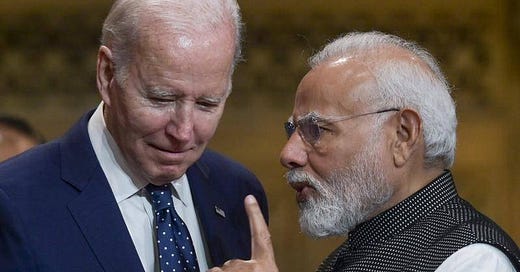Indian-US Ties Need The Breathing Space Given By Biden Canceling Part Of His Asia-Pacific Trip
The State Department’s “religious freedom” report lambasted this South Asian state on Monday, which created some drama in their relationship ahead of Prime Minister Modi’s planned visit to the US late next month.
The White House announced that Biden will be canceling the last two parts of his planned three-country trip to the Asia-Pacific on the pretext of having to participate in heated debt negotiations with Congress. He’ll therefore only visit Japan for the G7 Summit before returning home instead of dropping by Papua New Guinea to sign a new Defense Cooperation Agreement with that country during the Forum for India-Pacific Islands Cooperation (FIPIC) and then going to Canberra for this year’s Quad Summit.
Indian-US ties need the breathing space given by Biden canceling those legs of his Asia-Pacific trip since the State Department’s “religious freedom” report lambasted this South Asian state on Monday, which created some drama in their relationship. This was especially so after an unnamed senior State Department official demanded during a media briefing that Delhi condemns the state of religious affairs at home before Prime Minister Modi visits the US late next month.
These two countries are strategic partners who have plenty of complementarities between them, yet they’re unable to unleash their full potential due to the ideologically driven faction of the US’ permanent bureaucracy seeking to sabotage their ties. Instead of respecting India as the equal that it is in the eyes of international law like the pragmatic faction nowadays seeks to do, the ideologues want to continue pressuring it into domestic and foreign policy concessions, especially regarding Russia.
The State Department’s report is an annual occurrence and it was expected that the ideologues would exploit it to pressure India, but what took both sides off guard was that unnamed senior official demanding that Delhi condemns the situation at home prior to next month’s summit. Prime Minister Modi will still see Biden in Japan and possibly even hold an informal Quad meeting with him and their two counterparts while there, but he’s attending because he’s a guest, not a founding G7 member.
This is unlike India’s status as the FIPAC and Quad’s co-founder, which imbues Prime Minister Modi with the right to publicly address what Biden’s unnamed senior State Department official demanded of his government, whether on his own prerogative or if asked during a press conference. It would be undiplomatic for this to happen while he’s attending the G7 as a guest, but the situation is altogether different when it comes to the FIPAC and Quad Summits.
Considering how scandalous it is that the unnamed senior State Department official demanded that Delhi condemns the state of religious affairs at home before Prime Minister Modi visits the US at the end of next month, there’s a chance that he’ll be asked about it at those last two events. If Biden were there with him as his equal, particularly at the Quad Summit in Canberra, then both would be pressed to double down on their country’s respective positions and thus risk exacerbating this scandal.
Instead, Prime Minister Modi won’t have to deal with the optics of him supposedly “looking soft” if he diplomatically downplays that provocation should he be asked about it at those two events in order to keep his upcoming trip on track, which is in both countries’ national interests. Had Biden been by his side while asked about this, then the Indian leader would be pressured to send a strong signal of displeasure, thus prompting his US counterpart to reciprocate to “save face”.
To be clear, Biden does indeed have a plausible reason not to participate in the last two legs of his Asia-Pacific trip, even though it’s suspicious that his side didn’t suggest him calling in via video. That’s for the better when it comes to India-US relations though because both sides have a reason to avoid having the media ask them about the latest scandal from the State Department. This gives them much-needed breathing space, averts any potential worsening of their ties, and thus keeps next month’s trip on track.




